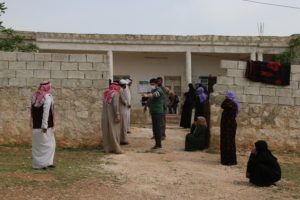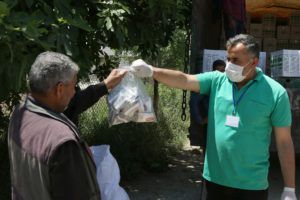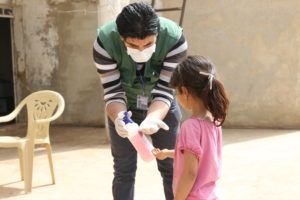 Stories
Stories
August 5, 2020 • 5 min read
As part of our ‘GOAL on the Ground’ series we look at how GOAL is helping vulnerable communities fight the spread of COVID-19 in Northwest Syria.
For the past eight years, GOAL has been on the ground in Idleb and northern Aleppo, providing food, water, and emergency assistance to conflict-affected communities, reaching more than 1.2 million people every year.
GOAL is one of the largest international NGOs in the northwest of Syria. Since March, following the global spread of COVID-19, we have worked to adapted our outreach programmes to ensure that the most vulnerable communities have the supplies they need to survive and to prevent infection from occurring.
The first case of COVID-19 in Idleb Province was recorded on the 9th of July, and more than 30 cases have since been documented in the region so far. While the outbreak has not yet expanded to the community level, the healthcare infrastructure in the country’s northwest is significantly unprepared to deal with a large uptake of COVID-19 cases. GOAL’s dedicated humanitarian workers on the ground continue to deliver vital assistance to vulnerable communities in Idleb and northern Aleppo, striving to implement our aid programmes as safely as possible.
The Challenges in Syria
The 9-year war has had a devastating impact on the people of Syria, which is believed to have claimed over 500,000 lives. It has also left over 7 million people internally displaced with over 6 million more fleeing the country to escape. Thousands of highly trained medical professionals have been killed as a result of indiscriminate bombings on hospitals, and around 70% of Syria’s physicians have fled the country. Much of Syria’s healthcare infrastructure have been left in ruins– the World Health Organisation (WHO) estimates that around half of all public hospitals in Syria are either completely destroyed or functioning only partially.
In the country’s northwest, there are currently fewer than 200 doctors and only 64 medical facilities, many of which lack the capacity to care for serious health infections.
More than 4 million people live in Idleb and northern Aleppo. A large proportion of them rely on aid to meet their basic needs such as shelter, water, food and medicine. For many families, the simplest of household supplies like soap, an essential component in combating the spread of COVID-19, are unaffordable.
Food Security and Emergency Response
GOAL has adapted its humanitarian assistance programmes in northwest Syria in order to ensure that vulnerable communities can continue to receive food in a safe environment. This has involved reorganising assistance distribution sites in line with infection prevention principles. It also includes implementing social distancing and promoting hand hygiene at aid transfer points, and mandating our staff to wear personal protective equipment (PPE) while on duty. GOAL is also prepared to start delivering in-kind food aid door-to-door in villages and camps in Idleb and northern Aleppo if a further spread of COVID-19 in northwest Syria leads to lockdowns.

GOAL is distributing cash to families in Idleb, Syria, to help them buy basic necessities.
GOAL has also taken steps to ensure that beneficiaries of our food security and emergency response programmes can access the knowledge and supplies that can help them avoid and prevent the spread of novel-coronavirus infections. In addition to reaching more than 4,500 individuals with COVID-19-focused hygiene promotion sessions at aid distribution sites since March, we have provided almost 10,000 households with soap parcels which were sufficient to cover a large family’s requirements for the months of April and May.
In addition to delivering aid directly to beneficiaries, GOAL’s food security programmes in the northwest also supports 20 bakeries in Idleb with contributions towards their production inputs, helping to produce bread at subsidized prices. These bakeries supported by GOAL provide bread at around half the market price to a population of more than 400,000, covering a wide geographic area. In order to ensure that these bakeries continue to operate safely, GOAL has trained all bakery employees on infection prevention and control, and have provided personal protective equipment and sterilization supplies to both bakeries and bread vendors. Through this initiative, we have provided 7,250 bundles of masks and gloves as well as around 500 liters of hand disinfectant to 470 bread vendors’ distribution points. GOAL Syria has also begun to introduce fliers containing information on the risk of COVID-19 to bread bags distributed by the bakeries we support, reaching more than 150,000 families with vital hygiene and infection prevention knowledge.

GOAL has distributed bars of soap to over 7,000 people in Idleb, Syria
Water, Sanitation and Hygiene (WASH)
Maintaining proper personal hygiene has never been more important than in the era of COVID-19. But in Syria, with frequent outages in the public water network, many communities have to rely on unsafe, irregular sources of water delivery. According to the United Nations’ Humanitarian Needs Overview report for 2019, families in Syria who buy water from mobile trucks spend up to 40 per cent of their income on their water needs. In Idleb, trucks are the only source of water for around 45 per cent of the population.
GOAL supports 64 water stations in Idleb with maintenance, supplies and technical oversight to help deliver piped, potable running water to more than 900,000 people on a regular basis, covering a large catchment area of villages, towns and cities. Since April, GOAL has been working to scale up our support to water stations in order that more water can be delivered to beneficiaries every day. From August, all water stations we support will provide at least 30 liters of water per day on average to more than 100 communities.

GOAL staff helping local people sanitise their hands to combat Covid-19 in Idleb.
Concerns going forward for GOAL Syria
For now, a fragile ceasefire established last March seems to be holding in Syria, and despite some sporadic incidents of violence from all sides, there has been a noticeable decrease in conflict. In a Discussion Paper published in June, entitled ‘Limiting the Impact of Covid-19 on the world’s most vulnerable’, GOAL has called for the UN humanitarian response plans to be fully funded and that warring parties heed the global ceasefire call led by the UN Secretary General. Whilst GOAL expressed its disappointed that no agreement was reached last July at the UN Security Council vote to ensure continued access of life-saving humanitarian assistance to the two border crossings open between Turkey and Syria, GOAL welcomed the compromise resolution which ensures for now that vital humanitarian aid will continue to reach the 2.3 million in desperate need in Idleb.
